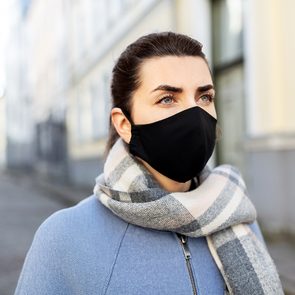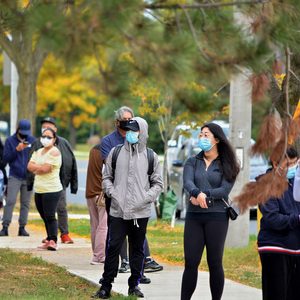What Canadians Need To Know About the New COVID-19 Vaccines

The global race to create an effective COVID-19 vaccine started only months ago, but two frontrunners are poised to cross the finish line in record time.
On November 9, U.S. pharmaceutical company Pfizer announced that its mRNA vaccine, which is being developed with German biotech company BioNTech, appears to protect against SARS-CoV-2, the virus that causes the COVID-19 infection.
Seven days later, Massachusetts-based Moderna reported that, according to preliminary findings, its own mRNA vaccine may be up to 94.5 per cent effective.
Then, more news: Pfizer gave an update that its vaccine had reached stage 3 clinical trial efficacy points. It concluded that its vaccine is 95 per cent effective and is beneficial to older people. The company said it would be applying to the U.S. FDA for emergency use authorization “within days.”
The back to back announcements have naturally generated considerable excitement. But it’s probably wise to leave the champagne corked for now. The findings are “promising,” says Susy Hota, an infectious disease specialist and the medical director of prevention and control at the University Health Network in Toronto. But there are still a few hurdles left to clear before the vaccines are made readily available.
Here’s what you need to know about these vaccines—and when they’ll be available to Canadians.
Are these COVID-19 vaccines approved by Health Canada?
Both Pfizer and Moderna began their clinical trials in late July of this year. Pfizer enrolled nearly 44,000 participants, Moderna 30,000 participants. Part of the inclusion criteria for participants was that they had an “appreciable” risk of contracting the virus either because of where they lived or other circumstances. Each set of participants were divided into two groups: people who were given two doses of the vaccine and people who were given placebo or saltwater doses of the vaccine. Each trial was evaluated by an independent board of experts.
Health Canada is reportedly working directly with pharma companies like Moderna and Pfizer, getting the trial results as they become available in real-time rather than waiting for the studies to conclude—a situation which could potentially shorten the time for eventual approval here.
If the Pfizer and Moderna vaccines are approved by the FDA for emergency use, Hota doesn’t think there would be a measurable lag between that and Health Canada approval.
“It has to go through Health Canada’s approval process, too,” she says. “But I don’t think that’ is going to be a lengthy, difficult process.”
What’s an mRNA vaccine, and how does it protect against the coronavirus?
Both the Pfizer and Moderna candidates are mRNA-based vaccines—a type of vaccine that uses genetic material to provoke an immune response against the virus in the body (rather than conventional vaccine formulations that use live or attenuated forms of the virus itself to fight infection).
RNA is a type of nucleic acid we already have in our bodies. The Pfizer and Moderna vaccines work by injecting an mRNA code that prompts the existing cells of your body to produce a replica of the spike protein that sits on top of the Sars-Cov2 virus. “Your immune system recognizes that spike protein as foreign and attacks it,” says Hota. The immune system produces an army of “soldiers” that are primed to attack that spike protein should it appear in your body again—as it would if you subsequently became infected with the virus.
An mRNA-based vaccine is an attractive option to fight the coronavirus because of its potency, its relative low cost, and its capacity for being developed and administered more rapidly in a lab than conventional vaccines.
There is an added wrinkle with the Pfizer vaccine, and that’s storage. Its vaccine needs to be kept in very cold conditions, around -70C. That presents an extra layer of challenge when it comes to distribution as that puts most pharmacies and doctor’s offices out of the running. By contrast, Moderna says its vaccine can be refrigerated at -20 C, a temperature that makes it more likely to be distributed conventionally in doctor’s offices and pharmacies.
How long do these COVID-19 vaccines protect you against infection?
The short answer: that’s to be determined. It’s not clear yet whether or not the vaccines offer lasting protection against the SARS-CoV-2 virus that causes COVID-19, or whether the immune response they generate lessens over time. It’s also not firmly established whether or not the vaccines benefit most adults broadly or just certain groups. In its latest announcement, Pfizer indicated its vaccine is beneficial to people over 65 years old, but the clinical data supporting that claim hasn’t been made readily available.
Time will also tell whether or not the vaccine offers protections to people who’ve had the virus before and if it can act to reduce the severity of the virus should someone get infected after being vaccinated.
Are they safe?
The preliminary findings in both trials suggest there are no significant safety concerns with either vaccine. That said, the data is still being collected and both companies intend to follow trial participants for a period of years.
That long-term follow-up is standard procedure with any new medication or therapy, says Hota. She doesn’t see any red flags when it comes to safety but warns that the public should be primed for a few bumps in the road ahead. “It’s likely that over time we will learn which vaccines are better than others and that will be a longer process,” she says.
The vaccines do appear to generate some side effects, including headache, soreness and fatigue. These kinds of side effects aren’t uncommon: the shingles vaccine can cause similar symptoms.
When will they be rolled out across Canada?
That depends on when they’re approved by Health Canada. Prior to Pfizer’s update, Prime Minister Justin Trudeau had said he believes a vaccine could be available in Canada during the first three months of 2021. It’s not clear if higher risk populations and health care workers in Canada would be given the vaccine earlier than that, but it’s fair to assume they would be first in line.
Canada has reached a deal with Pfizer to buy 20 million doses with options of up to 56 million additional doses (a total of 76 million doses). The government has a similar deal with Moderna for 20 million doses with options for up to 36 million additional doses (a total 56 million doses).
These two aren’t the only vaccines Canada is eyeing for use here.
A representative for the Government of Canada’s Public Services and Procurement Department, which deals with the vaccines, confirmed that Canada currently has agreements with seven different companies, including Pfizer and Moderna.
What does this mean for us right now?
Aside from the much-needed mood-booster, not much more than a TBD “Save the Date.” Canada and much of the rest of the world is still in the middle of a pandemic and infections are growing exponentially. Canada currently has over 300,000 reported cases of coronavirus.
We’re in for a long winter, and this is not the time to let your guard down. If you want to pop that champagne cork sometime in 2021, you’d be well advised to continue to socially distance, reduce your contacts and wear a mask.
“These public health measures are more important than ever now,” says Hota.
Next, find out the science behind the “super-spreaders” of COVID-19.






